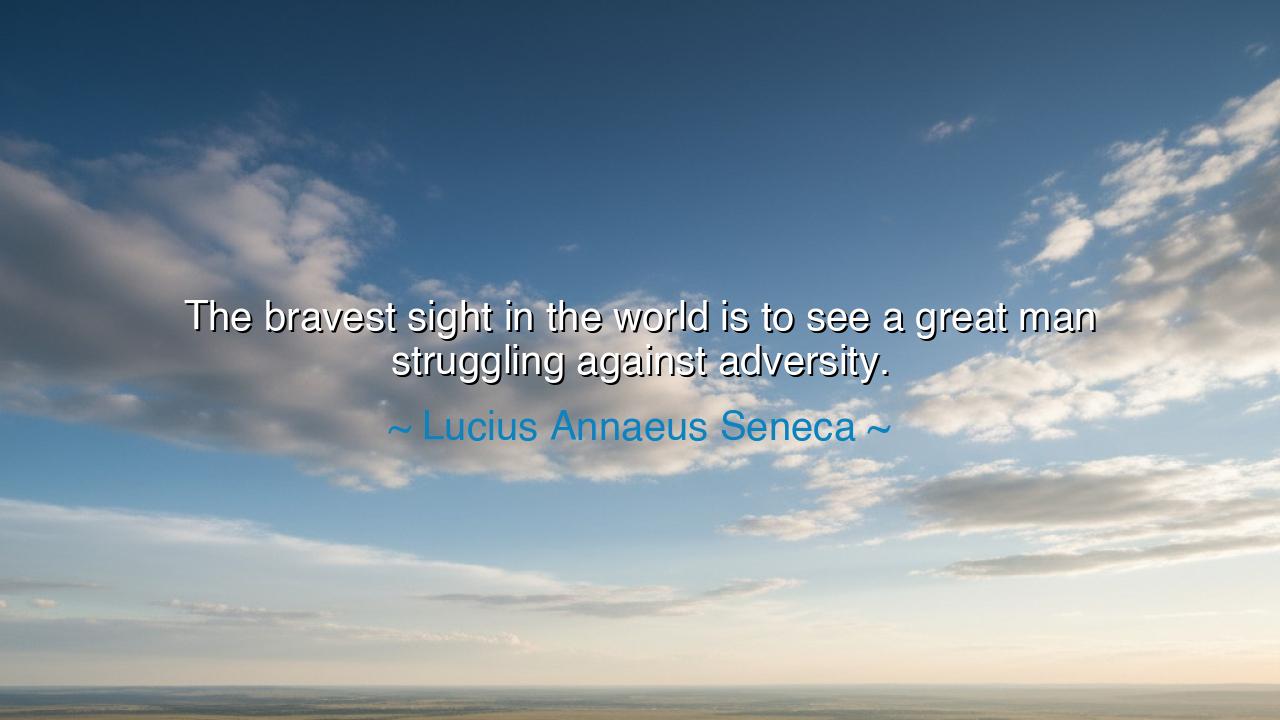
The bravest sight in the world is to see a great man struggling






When Lucius Annaeus Seneca, the great Stoic philosopher of ancient Rome, wrote, “The bravest sight in the world is to see a great man struggling against adversity,” he was not speaking of victory, but of valor — the kind that is born not on the battlefield, but in the soul. These words, as luminous as they are ancient, come from a man who knew suffering intimately, a man who lived under tyrants, faced exile, and awaited death with composure. Seneca’s wisdom reminds us that true greatness does not lie in ease or comfort, but in the steadfast endurance of hardship. To witness a noble soul enduring pain without surrender is to behold one of life’s highest forms of beauty — the triumph of the spirit over circumstance.
In the Roman world, where glory was often measured by conquest and the spilling of blood, Seneca dared to redefine courage. He looked not to the sword or the general, but to the philosopher and the man of principle. The bravest sight, he said, is not the conqueror adorned in laurels, but the person who stands unbroken while fate tests every fiber of his being. The soldier who endures defeat with dignity, the parent who carries sorrow with grace, the thinker who keeps his truth under tyranny — these are the heroes of endurance. For adversity, Seneca taught, is the forge in which the soul’s metal is tested and refined.
History itself is rich with such examples. Think of Nelson Mandela, who spent twenty-seven years in prison, stripped of freedom and comfort, yet never surrendered his belief in justice and peace. The world saw in him not a broken man, but a great man struggling against adversity, and through that struggle, he rose beyond politics to embody moral greatness. The courage he showed did not lie in his defiance alone, but in his patience, restraint, and faith — virtues forged in the furnace of suffering. His life echoed Seneca’s teaching: that even when the body is confined, the soul can remain sovereign, unconquered by chains or cruelty.
Seneca himself lived this philosophy. Once a trusted advisor to Emperor Nero, he fell into disfavor and was forced to take his own life — a fate he met with calmness and clarity. As the poison coursed through his veins, he spoke to his disciples with serenity, discussing philosophy even as death approached. In that final moment, he embodied the truth of his own words: the bravest sight is not to see a man escaping death, but one who meets it without fear. His composure transformed tragedy into triumph, teaching all who came after him that adversity, when faced with wisdom, cannot destroy the spirit — it can only reveal its depth.
The Stoics, of whom Seneca was one of the greatest, believed that suffering is not the enemy, but the teacher. They saw in hardship the opportunity to practice virtue — courage, patience, self-control, and justice. To them, the external world could bring misfortune, but it could never touch the inner fortress of the soul, unless one allowed it. Thus, to watch a great person struggle nobly is to witness the highest act of human strength: the mastery of the self. For the storms of life do not create greatness — they unveil it.
This truth is not confined to ancient Rome or modern heroes; it lives in the quiet struggles of ordinary lives. The mother who endures poverty yet raises her children with love, the student who perseveres through failure, the worker who maintains honesty amid corruption — all these, too, are brave sights in the world. Greatness is not measured by fame or title, but by one’s refusal to yield when life demands everything. Each act of resilience, however unseen, adds to the silent army of souls who prove that dignity cannot be taken, only surrendered.
So, my listener, take this wisdom into your heart: do not flee adversity — face it. When hardship comes, as it must to all mortals, meet it not with despair but with purpose. Remember Seneca’s words: the world admires not the one who lives without struggle, but the one who struggles without losing honor. Be steadfast in trial, for your endurance will speak louder than your comfort ever could. When pain comes, let it find you courageous; when loss comes, let it find you wise. For it is in these moments that the measure of your soul is taken, and your unseen strength shines forth like gold purified in fire.
In the end, the bravest sight in the world is not the mountain conquered, but the climber who continues to ascend even when the summit is hidden in clouds. Be that climber. Endure with courage, and let your struggle itself become your victory. For though adversity may test the flesh, it crowns the spirit — and in that quiet triumph lies the eternal grandeur of humanity.






AAdministratorAdministrator
Welcome, honored guests. Please leave a comment, we will respond soon